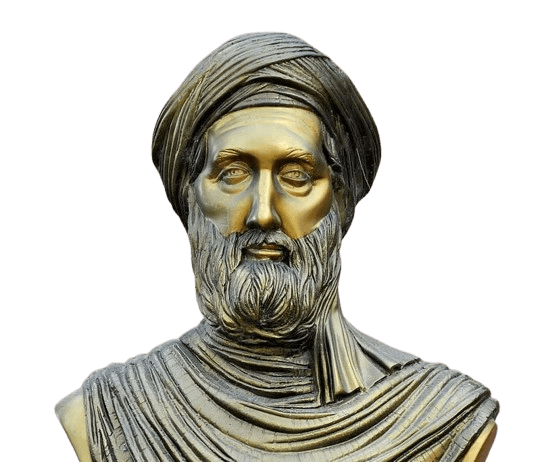Life and achievements
Early life
Ibn Khaldun was born into an upper-class Andalusian family that moved to Tunisia after the capture of Seville by the Reconquista. His family was one of the most powerful in Al-Andalus, giving him a classical Islamic education. Khaldun memorized the Quran and learned the Arabic language and its grammar, Hadith, Sharia, and Fiqh. His teachers were eminent scholars, and he obtained ijazah from all of them. The mathematician and philosopher Al-Abili taught him mathematics, logic, and philosophy, and he could read the works of Averroes, Avicenna, Razi, and Tusi.
Khaldun's parents died from the Black Death at the age of 17, leaving him orphaned. This tragedy affected him greatly, but he did not stop going to school and striving for the position of a politician. His early education and the milieu he received set the stage for his future work in historiography and sociology. Thanks to his family background, he could penetrate the upper stratum of society, which proved to be instrumental in his political and academic career.
Legacy
Thus, Ibn Khaldun left a great impact, and his work is still significant today. His Muqaddimah is one of the greatest works of this kind, which affected not only Islamic but also European scholarship. Ibn Khaldun is known for developing ideas that have influenced many disciplines, including "asabiyyah," the rise and fall of dynasties, and economic concepts. His methodology in writing history, which involved critical analysis and questioning sources, was revolutionary and formed the basis of historical study.
Khaldun's work is still relevant, and his ideas are still being studied by scholars who acknowledge his role in analyzing the rise and fall of societies. His ideas about the social order and power processes have been applied to politics and economics. Today's historians and economists, such as Arnold J. Toynbee and Arthur Laffer, have recognized Ibn Khaldun as the father of modern historians and economists. His thoughts on the nature of civilizations and their rise and fall still apply in the contemporary world to explain the current social and political trends.
Milestone moments
May 27, 1332
Birth of Ibn Khaldun
Ibn Khaldun was born on May 27, 1332, in Tunis into a family of noble social status with an Andalusian background. His family background can be attributed to Al-Andalus, where they held high offices. He later moved to Tunisia, where he was born and raised. Due to his noble origin, he could study with the most learned scholars. He received a sound Islamic education in Quran recitation, Arabic grammar, Hadith, Islamic law, and jurisprudence.
It is argued that family background and social status influenced his intellectual growth. This environment developed his curiosity in many areas of study, especially mathematics, logic, and philosophy, which he studied with the help of some leading academics. The death of his parents due to the Black Death was a personal tragedy in his early life, but this did not in any way hinder him from pursuing his education and preparing the way for his future contributions to historiography and sociology.
Jul 18, 1349
Tragedy and Persistence
Ibn Khaldun had a tragic experience in his teenage years when he lost both his parents at the age of seventeen due to the Black Death. This epidemic, which affected the whole world, had a profound effect on him. However, he was not a quitter and showed much strength by continuing his education and other academic activities. His determination during this challenging time laid the foundation for his subsequent success.
His parents' death could have set back his dreams, but instead, it motivated him to work hard to contribute to society in historiography, sociology, and economics. This phase of his life captured his strength to face challenges and concentrate on his dreams and objectives, which led him to develop theories on societies and civilizations.
Jul 18, 1352
Political Career Begins
Ibn Khaldun entered political life at the age of twenty and became a seal-bearer in the chancellery of the Tunisian ruler Ibn Tafrakin. This position required writing the preface of official documents in beautiful handwriting. He entered the political field in his early years and thus gained practical experience in government and administration that he used in his later theoretical analysis of state and politics.
This period in the chancellory was the starting point of a political career and an entire life of activities. Although he faced competition and enmities in his political positions in North Africa and Spain, Khaldun gained knowledge and experience in governance and power struggles. These ideas are seen in his later works, primarily in the Muqaddimah, where he discusses the emergence and decline of governments.
Oct 9, 1364
Mission to Castile
Ibn Khaldun was dispatched on a diplomatic mission to the court of Pedro the Cruel, the king of Castile, in 1364. This mission was on the part of the Sultan of Granada, Muhammad V, to ratify a peace accord. The author's diplomatic skills were also well seen in Khaldun's negotiations, as he successfully obtained the treaty and was even offered by Pedro to stay at his court, but he declined.
This mission proved that Khaldun was a skilled politician who could work through the political struggle and become a successful diplomat. His contact with foreign courts and rulers helped him gain more experience in the relations between countries and the strategies used in politics. It also exposed him to more political theory, which he applied in his later work on the rise and fall of empires and the use of diplomacy in statecraft.
